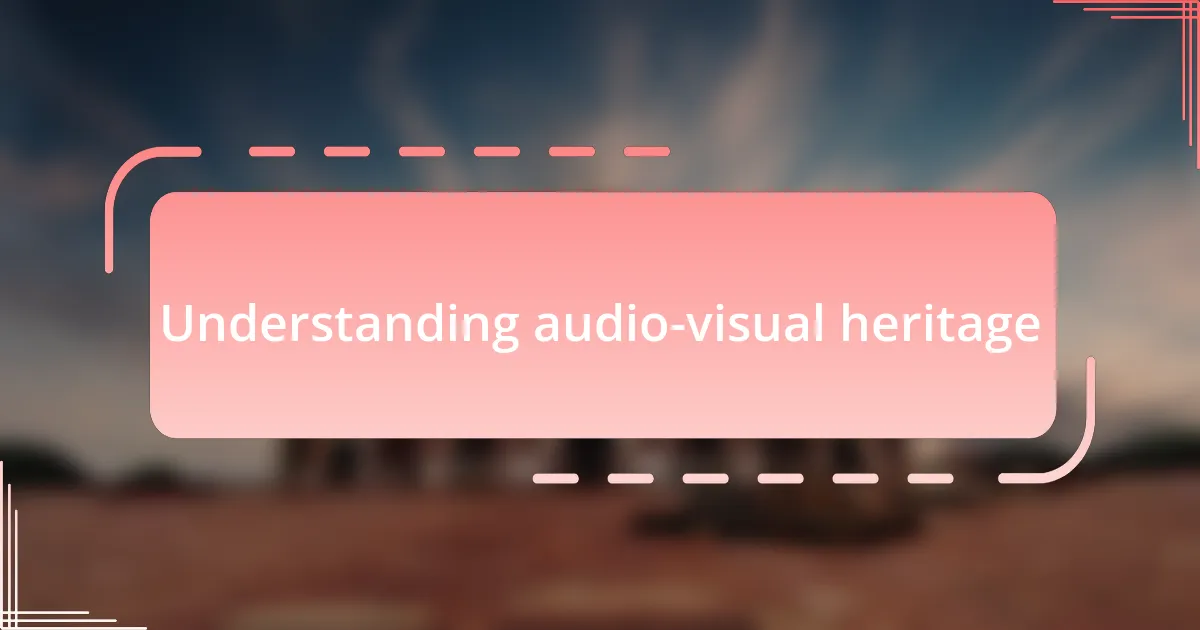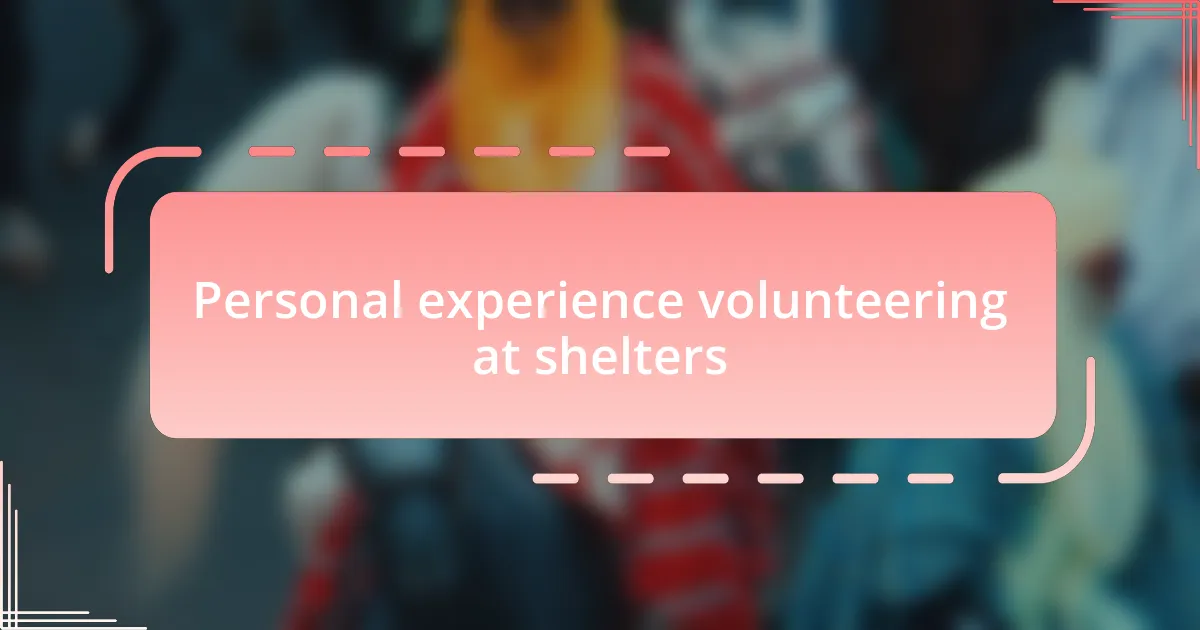Key takeaways:
- Audio-visual heritage is essential for preserving cultural identity and connecting generations through shared stories and experiences.
- The urgency of preserving this heritage is heightened by rapid technological changes, risking the loss of unique narratives if not digitized promptly.
- Volunteering in shelters fosters personal growth, broadens empathy, and builds community connections, while also developing valuable skills.
- Personal interactions during volunteering can lead to transformative experiences and insights, reshaping perspectives on what truly matters in life.

Understanding audio-visual heritage
Audio-visual heritage encompasses the rich tapestry of audiovisual materials created over time, from film and sound recordings to digital content. I remember the first time I stumbled upon an archive of old recordings; the crackling voices transported me to another era, making me appreciate how these relics capture moments of history that would otherwise fade away. Isn’t it fascinating how a simple photograph or recording can evoke such strong emotions and memories?
As I explored more about audio-visual heritage, I found myself reflecting on its role in shaping cultural identity. For instance, local documentaries often portray the stories of communities that may not be widely known. These stories matter, don’t they? They remind us that the past is not just a distant memory but a living narrative that influences our present and future.
Preserving audio-visual heritage is crucial, especially in our digital age where so much is at risk of being lost. I often wonder about the tapes gathering dust in people’s attics or the forgotten films in basements. How many of those hold untold stories that could connect generations? The urgency to archive these treasures speaks to our responsibility in fostering a deeper understanding of our collective experiences.

Importance of preserving audio-visual heritage
Preserving audio-visual heritage is vital not just for historical documentation but also for fostering connection. I recall watching a documentary about my hometown, showcasing its vibrant culture and hidden gems. It struck me how easily these narratives could disappear without preservation, leaving future generations without a window into their own cultural fabric. Have you ever considered how much our collective identity is shaped by the stories we retain?
Moreover, the emotional resonance of audio-visual materials cannot be overstated. I once listened to an old recording of my grandmother singing; it brought tears to my eyes and a sense of belonging that nothing else could replicate. This made me realize that preserving such recordings allows us to hold onto the voices and sentiments of those we love, creating bonds that transcend time. How many memories are tucked away in those forgotten archives?
Finally, the urgency of preserving this heritage is intensified by the rapid pace of technological change. I remember my initial shock when I learned about formats becoming obsolete, like VHS tapes fading into history. It made me ponder: what happens if we fail to digitize these treasures? Without timely preservation efforts, we risk losing unique perspectives, stories, and emotional connections forever. Isn’t it our duty to safeguard these glimpses into our past for the sake of future generations?

Benefits of volunteering in shelters
Volunteering in local shelters opens the door to profound personal growth. I remember my first day at a shelter; I was nervous but excited. It didn’t take long for me to realize that working closely with people in need enhanced my empathy and understanding of the diverse challenges they face. Have you ever felt your perspective broaden after connecting with someone from a completely different background?
Another significant benefit is the sense of community that comes from volunteering. I’ve formed friendships with fellow volunteers that extend beyond our time at the shelter. Those shared experiences, whether it’s distributing food or simply listening to someone’s story, create bonds that enrich our lives. Isn’t it amazing how a few hours spent in service can build lasting connections?
Additionally, volunteering can also provide tangible skills that are invaluable in various professional contexts. While helping organize events at the shelter, I honed my project management skills, which have proved useful in my career. I often encourage others to consider what they might learn, not just for their resume, but for their personal development and confidence. What skills could you discover by stepping out of your comfort zone?

Personal experience volunteering at shelters
Volunteering at the shelter was a transformative experience for me. I vividly remember one particular evening when I sat with a young mother and her children. Listening to her story of resilience amid hardship connected me deeply with her struggle — it was a stark reminder of our shared humanity. Have you ever felt your heart expand with compassion in such a moment?
One memorable day, I organized a small art project for the children at the shelter. Watching their faces light up as they created something meaningful was incredibly rewarding. It wasn’t just about the artwork; it was about giving them a moment of joy and creativity in a challenging environment. How often do we overlook the simple power of expression in our busy lives?
Over time, I noticed that my own mindset began to shift too. I found joy in small victories, like helping someone find a warm coat or listening to a story that might otherwise have gone unheard. Those moments made me realize how each interaction at the shelter had the potential to impact lives, including my own. Isn’t it remarkable how volunteering can reshape our outlook on what truly matters?

Skills gained from volunteering
When I volunteered at the shelter, I discovered the importance of communication skills. One afternoon, I found myself mediating a disagreement between two volunteers over how to arrange a donation drive. It was a challenge, but I learned how to listen actively and adapt my communication style to ease the tension. Have you ever realized that the way we talk can either bridge gaps or widen them?
Additionally, I developed strong organizational skills while coordinating events for the shelter. Picture this: I was juggling multiple tasks, from creating schedules to managing supplies. Each event taught me how to prioritize effectively, ensuring that everything flowed smoothly. I often wondered how I managed to keep everything in check, but the satisfaction of a well-executed project made all the effort worth it.
Moreover, volunteering helped me build empathy and emotional intelligence. I remember speaking with a resident who had lost everything in a fire, and the experience made me acutely aware of the fragility of life. It became evident that understanding others’ feelings is crucial, not just in volunteer work but in our everyday interactions. Isn’t it fascinating how a simple conversation can deepen our connections and enhance our understanding of the world?